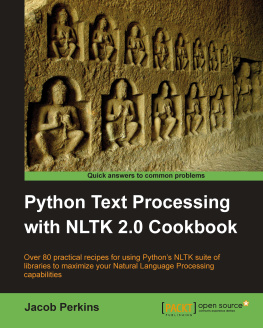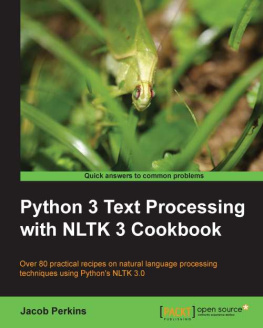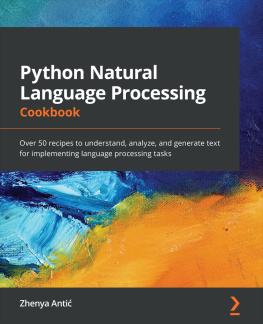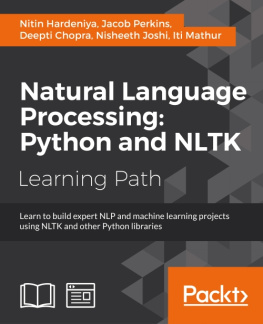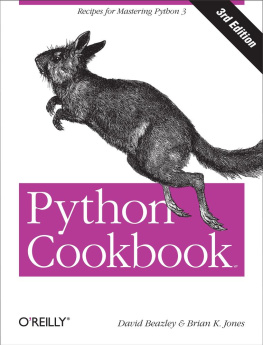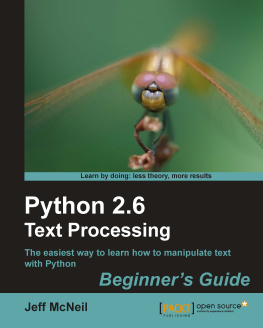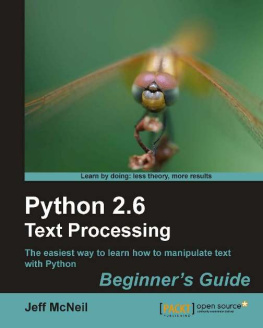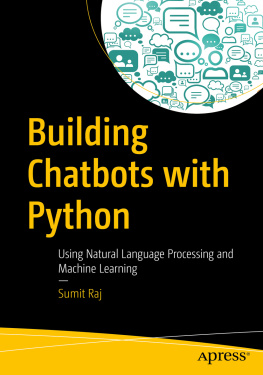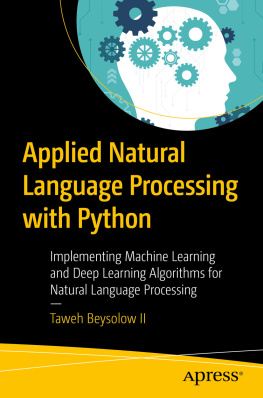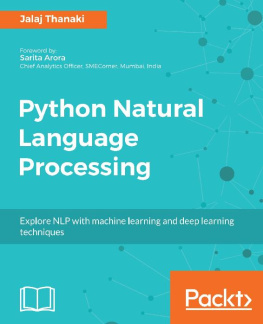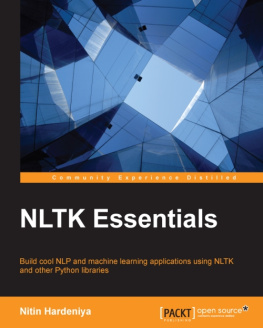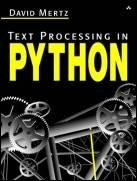Jacob Perkins - Python Text Processing with NLTK 2.0 Cookbook : LITE
Here you can read online Jacob Perkins - Python Text Processing with NLTK 2.0 Cookbook : LITE full text of the book (entire story) in english for free. Download pdf and epub, get meaning, cover and reviews about this ebook. year: 2011, publisher: Packt Publishing, genre: Children. Description of the work, (preface) as well as reviews are available. Best literature library LitArk.com created for fans of good reading and offers a wide selection of genres:
Romance novel
Science fiction
Adventure
Detective
Science
History
Home and family
Prose
Art
Politics
Computer
Non-fiction
Religion
Business
Children
Humor
Choose a favorite category and find really read worthwhile books. Enjoy immersion in the world of imagination, feel the emotions of the characters or learn something new for yourself, make an fascinating discovery.
- Book:Python Text Processing with NLTK 2.0 Cookbook : LITE
- Author:
- Publisher:Packt Publishing
- Genre:
- Year:2011
- Rating:3 / 5
- Favourites:Add to favourites
- Your mark:
- 60
- 1
- 2
- 3
- 4
- 5
Python Text Processing with NLTK 2.0 Cookbook : LITE: summary, description and annotation
We offer to read an annotation, description, summary or preface (depends on what the author of the book "Python Text Processing with NLTK 2.0 Cookbook : LITE" wrote himself). If you haven't found the necessary information about the book — write in the comments, we will try to find it.
Jacob Perkins: author's other books
Who wrote Python Text Processing with NLTK 2.0 Cookbook : LITE? Find out the surname, the name of the author of the book and a list of all author's works by series.
Python Text Processing with NLTK 2.0 Cookbook : LITE — read online for free the complete book (whole text) full work
Below is the text of the book, divided by pages. System saving the place of the last page read, allows you to conveniently read the book "Python Text Processing with NLTK 2.0 Cookbook : LITE" online for free, without having to search again every time where you left off. Put a bookmark, and you can go to the page where you finished reading at any time.
Font size:
Interval:
Bookmark:
Copyright 2010 Packt Publishing
All rights reserved. No part of this book may be reproduced, stored in a retrieval system, or transmitted in any form or by any means, without the prior written permission of the publisher, except in the case of brief quotations embedded in critical articles or reviews.
Every effort has been made in the preparation of this book to ensure the accuracy of the information presented. However, the information contained in this book is sold without warranty, either express or implied. Neither the author, nor Packt Publishing, and its dealers and distributors will be held liable for any damages caused or alleged to be caused directly or indirectly by this book.
Packt Publishing has endeavored to provide trademark information about all of the companies and products mentioned in this book by the appropriate use of capitals. However, Packt Publishing cannot guarantee the accuracy of this information.
First published: November 2010
Production Reference: 1031110
Published by Packt Publishing Ltd.
32 Lincoln Road
Olton
Birmingham, B27 6PA, UK.
ISBN 978-1-849513-60-9
www.packtpub.com
Cover Image by Sujay Gawand (<>)
Author
Jacob Perkins
Reviewers
Patrick Chan
Herjend Teny
Acquisition Editor
Steven Wilding
Development Editor
Maitreya Bhakal
Technical Editors
Bianca Sequeira
Aditi Suvarna
Copy Editor
Laxmi Subramanian
Indexer
Tejal Daruwale
Editorial Team Leader
Aditya Belpathak
Project Team Leader
Priya Mukherji
Project Coordinator
Shubhanjan Chatterjee
Proofreader
Joanna McMahon
Graphics
Nilesh Mohite
Production Coordinator
Adline Swetha Jesuthas
Cover Work
Adline Swetha Jesuthas
Jacob Perkins has been an avid user of open source software since high school, when he first built his own computer and didn't want to pay for Windows. At one point he had five operating systems installed, including Red Hat Linux, OpenBSD, and BeOS.
While at Washington University in St. Louis, Jacob took classes in Spanish and poetry writing, and worked on an independent study project that eventually became his Master's project: WUGLEa GUI for manipulating logical expressions. In his free time, he wrote the Gnome2 version of Seahorse (a GUI for encryption and key management), which has since been translated into over a dozen languages and is included in the default Gnome distribution.
After receiving his MS in Computer Science, Jacob tried to start a web development studio with some friends, but since no one knew anything about web development, it didn't work out as planned. Once he'd actually learned about web development, he went off and co-founded another company called Weotta, which sparked his interest in Machine Learning and Natural Language Processing.
Jacob is currently the CTO/Chief Hacker for Weotta and blogs about what he's learned along the way at http://streamhacker.com/. He is also applying this knowledge to produce text processing APIs and demos at http://text-processing.com/. This book is a synthesis of his knowledge on processing text using Python, NLTK, and more.
Thanks to my parents for all their support, even when they don't understand what I'm doing; Grant for sparking my interest in Natural Language Processing; Les for inspiring me to program when I had no desire to; Arnie for all the algorithm discussions; and the whole Wernick family for feeding me such good food whenever I come over.
Patrick Chan is an engineer/programmer in the telecommunications industry. He is an avid fan of Linux and Python. His less geekier pursuits include Toastmasters, music, and running.
Herjend Teny graduated from the University of Melbourne. He has worked mainly in the education sector and as a part of research teams. The topics that he has worked on mainly involve embedded programming, signal processing, simulation, and some stochastic modeling. His current interests now lie in many aspects of web programming, using Django. One of the books that he has worked on is the Python Testing: Beginner's Guide .
I'd like to thank Patrick Chan for his help in many aspects, and his crazy and odd ideas. Also to Hattie, for her tolerance in letting me do this review until late at night. Thank you!!
Natural Language Processing is used everywherein search engines, spell checkers, mobile phones, computer games, and even in your washing machine. Python's Natural Language Toolkit (NLTK) suite of libraries has rapidly emerged as one of the most efficient tools for Natural Language Processing. You want to employ nothing less than the best techniques in Natural Language Processingand this book is your answer.
Python Text Processing with NLTK 2.0 Cookbook is your handy and illustrative guide, which will walk you through all the Natural Language Processing techniques in a step-by-step manner. It will demystify the advanced features of text analysis and text mining using the comprehensive NLTK suite.
This book cuts short the preamble and lets you dive right into the science of text processing with a practical hands-on approach.
Get started off with learning tokenization of text. Receive an overview of WordNet and how to use it. Learn the basics as well as advanced features of stemming and lemmatization. Discover various ways to replace words with simpler and more common (read: more searched) variants. Create your own corpora and learn to create custom corpus readers for data stored in MongoDB. Use and manipulate POS taggers. Transform and normalize parsed chunks to produce a canonical form without changing their meaning. Dig into feature extraction and text classification. Learn how to easily handle huge amounts of data without any loss in efficiency or speed.
This book will teach you all that and beyond, in a hands-on learn-by-doing manner. Make yourself an expert in using the NLTK for Natural Language Processing with this handy companion.
, Tokenizing Text and WordNet Basics , covers the basics of tokenizing text and using WordNet.
, Replacing and Correcting Words , discusses various word replacement and correction techniques. The recipes cover the gamut of linguistic compression, spelling correction, and text normalization.
, Creating Custom Corpora , covers how to use corpus readers and create custom corpora. At the same time, it explains how to use the existing corpus data that comes with NLTK.
, Part-of-Speech Tagging , explains the process of converting a sentence, in the form of a list of words, into a list of tuples. It also explains taggers, which are trainable.
, Extracting Chunks , explains the process of extracting short phrases from a part-of-speech tagged sentence. It uses Penn Treebank corpus for basic training and testing chunk extraction, and the CoNLL 2000 corpus as it has a simpler and more flexible format that supports multiple chunk types.
, Transforming Chunks and Trees , shows you how to do various transforms on both chunks and trees. The functions detailed in these recipes modify data, as opposed to learning from it.
Font size:
Interval:
Bookmark:
Similar books «Python Text Processing with NLTK 2.0 Cookbook : LITE»
Look at similar books to Python Text Processing with NLTK 2.0 Cookbook : LITE. We have selected literature similar in name and meaning in the hope of providing readers with more options to find new, interesting, not yet read works.
Discussion, reviews of the book Python Text Processing with NLTK 2.0 Cookbook : LITE and just readers' own opinions. Leave your comments, write what you think about the work, its meaning or the main characters. Specify what exactly you liked and what you didn't like, and why you think so.

